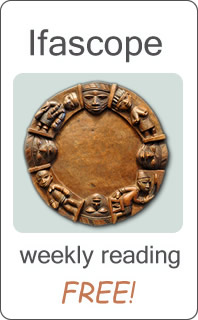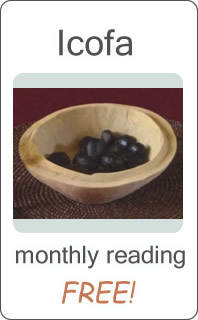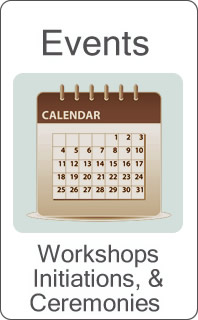The Americanization of Ifa/Orisa
The power and beauty of Ifa flows from the living energy of the Orisa. This energy, far from being a series of static absolute truths such as other religions have attempted to offer, is an ever changing dynamic that approaches, diagnoses and guides each individual within the context, society and culture they live and work in. It is respectful of the past.not anchored to it.
It has been the purpose, and goal, of the Ifa Foundation to explore and teach how this living eternal energy can most effectively be used in Western society.
Some of these conclusions have been rather simple. Others, more complex. Some have been accepted rather quickly. Others have caused great consternation among those who feel that any change from the way things were done hundreds, or thousands, of years ago is somehow sacrilegious and disrespectful. Without exception, each and every adaptation, or modification, from classic African practice, has been based on logic as well as the belief that Oludumare created a consistent universe for us to live in. Indeed, to believe anything else is to abandon all reason, all rules, all hope for being masters of our own Destiny.
From the concept of Ori, to the necessity of good character; from the guidance of divination, to the availability of Orisa energy, all flow in a logical, symmetrical system that offers the individual a safe passage to fulfilling our Destiny.
It was the Ifa Foundation that first recognized the logic and validity of divination over the phone or Internet. To suppose that the client had to be seated across from the Diviner in order for the eternal vision and wisdom of Orunmila who, by definition, is the Witness of Fate, and to who all past, present and future probabilities are clear, simply was illogical. To suggest that prayers are only valid if they are uttered in the original Yoruba is equally illogical. If Oludumare cannot understand all languages, we are praying to the wrong entity. To suggest that Ifa is limited to a certain culture, skin color or sexual orientation is equally illogical. Had Oludumare not wanted diversity, He would not have created it. To suggest that only Palm Oil, or the herbs of Africa, could effectively present themselves to the energy of the Orisa simply doesn't make sense. Certainly Oludumare created His energies so they would be available to all people of all cultures and climates. Would an Eskimo, of good character, who wanted to offer oil to the Orisa, be prohibited from offering Whale oil when no plants for red Palm oil existed in his country? Certainly not. Would the orisa demand that you shave your head and dress only in white for a year if, in so doing, you would jeopardize your job, livelihood and the welfare of your family? It doesn't make sense.
This is not to say that the traditional methods were wrong. They were right ...for the time, culture and circumstances of Africa. Many are not right, for Americans today.
More complex is the structure and initiation process of Priests in this hemisphere.
For example, I recently went through a discourse with an individual who believes that one cannot be a Babalawo unless one can memorize and recite Pataki for each of the odu. He is anchored to the past. For thousands of years, Ifa and orisa were an oral tradition. As such, it was imperative that the training process sees that the individual could access the information necessary for divination. The only way to achieve this was through memorization. The important thing was not the memorization, it was the information! Today that information exists in dozens of books, websites all over the world, and even tapes of the Pataki themselves. Why would you devote your time to memorizing this information when it is available through the turn of a page or the click of your browser? It would be far better to spend the time previously consumed in memorization in attempting to understand and expand on the wisdom and the energy itself. Interestingly enough, the individual found no problem in e-mailing me his opinions regarding the frozen nature of Ifa.
In other areas, the procedures of the past, which are no longer possible in our culture, insist that other kinds of adaptations take place. These exist in our views of the Ile' or House. While those associations, in the context of their time, social and cultural realities offered knowledge and protection to the individuals who belonged.and who repaid this with unyielding loyalty, today's world offers thousands of avenues to knowledge as well as the opportunity to learn and share with those of like mind all over the world! It is not logical to limit yourself and your knowledge to one group.
Another example of the Foundation's approach to these areas has to do with the ceremony for receiving the knife.
Many have written to suggest that this ceremony exists only in Lucumi, or Santeria. That it is not a part of African practice. They maintain that in Africa, once you are initiated as a Babalawo, you automatically were allowed to sacrifice four legged animals.
Rather than get involved in a "he said", "she said" argument, let me simply give you the logical reason why the Ifa Foundation offers the ceremony of receiving the knife, as a separate initiation.
In traditional African practice, the approval of a Babalawo took place ONLY after years of apprenticeship and learning. Ten and fifteen years of study, work and learning were the norm for those aspiring to become Awo. It could safely be assumed that, after all those years, the initiate would begin their practice with a great deal of knowledge, wisdom and expertise. With those traits, sacrificing of four legged animals was no problem.
In our society, the overwhelming numbers of Priest initiates spend one week for their ceremony! A few have some background and knowledge, but the vast majority have careers, vocations and families, which have occupied most of their life. For them, initiation is THE BEGINNING of a process, not the achievement of it! I have always been amused by some of my fellow Priests who, twenty minutes after their initiations began to produce books, spew forth wisdom they could not possible have achieved, and strut imperiously around like some Bantam cock deluding themselves that they are in control of the Barnyard!
What does this have to do with sacrificing four legged animals?
In Ifa, offerings will generally reflect the issue being dealt with. To state it another way, "simple problems tend to have simple solutions." If the diviner sees things are going well, or are only slightly out of balance, ebbos of oil, honey, liquor etc. will usually suffice. Larger issues or problems require blood. For most of these, two legged animals will suffice. But for those critical issues and profound imbalances, as well as for the dynamic energy of initiation, four legged animals are required. It is the judgement of the Foundation that before a Western Priest should make these often life changing, or life saving, decisions and sacrifices, that they achieve a level of experience and knowledge likely to assure that those decisions and actions are correct. Once it is determined that they have achieved this level, then it is appropriate to receive the knife and be empowered to use it.
Our attitude is not based upon "creating" an additional ceremony for money. Indeed, we have pioneered making initiations more affordable and providing scholarships to the deserving but financially unable. This decision is based on the logical reality of how Western Priests are initiated and trained. It is meant to protect them, and their clients from getting in over their heads.
For much the same reason that a Babalawo can only be initiated by another Babalawo who has obtained the stature, wisdom and knowledge to possess the Igba Iwa, the knife ceremony has become a critical safeguard, as well as a goal, in their development. Within these restrictions, hopefully, is the wisdom and character necessary for deciding who to initiate and why. The same applies to sacrificing four legged animals.
Blessings,
Oluwo Philip Neimark




